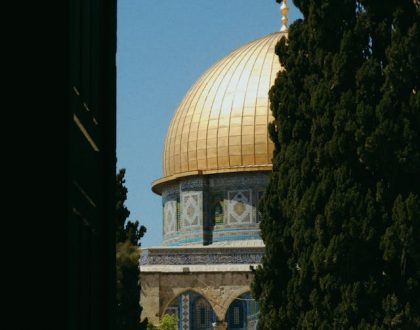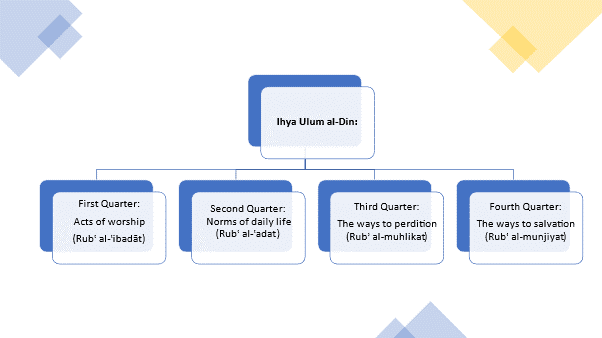Ghazali on tawbah

Ghazali lived in 5th century Hijri (450H-505H=1058- 1111), and his book, Kitaab Al-Arba’in Fi Usul ad-Din, ‘The Forty Principles of the Religion,’ which he wrote before his death, is a summary of Ihya Ulumuddin, and his life’s works and thoughts.
Overview of the book
Ihya Ulum al-Din is divided into four sections. The first quarter is related to worship. The second is al-adat, which are norms, customs and habits. The third quarter is about muhlikat, which are the ways to perdition. The last section is about al munjiyat, (from najat), meaning the ways to salvation.
Ghazali divided his book “The forty principles” into four sections. Each section has ten chapters. The total is forty, which is why his book is called the Forty Principles.
There are ten principles of belief in the first chapter. Chapter two contains the outer actions and worship, chapter three is about purifying the heart from blameworthy characteristics, and the final chapter is about praiseworthy characteristics, making a total of forty. This is the overview of the characteristics.
The 10 Praiseworthy character traits
Tawbah – to come back
Tawbah comes from the root letters ta-ba, which means ‘to go back’. Da ha ba in Arabic means to go out and ‘aada means to come back. Strikingly and rather unusually, when you compare the Arabic to the English they are very similar, as repent also means ‘to come back’. This is the linguistic meaning. The spiritual meaning is to come back to Allah. Where were you, that you needed to come back? Ghazali elaborates that the one who returns is the one who had gone far away and left the right track.
Ghazali defines tawbah as the path of the traveller. If you want to travel to Allah, the path starts with tawbah. It is the key to happiness for those who want Allah and His pleasure.
If you want to be happy, you have to use the key -that key is tawbah. To be happy means to be with Allah, just as the baby goes back to his mother’s lap. In a nutshell repentance brings happiness to your heart.
Sufis use the term murid for the one who wants Allah. If you are sincere about wanting Allah, you need to do tawbah.
Tawbah is the polish which makes your heart shine.
The icing on the cake
The building blocks are belief, and then worship and then ridding yourself of blameworthy characteristics. Once these are in place, you can put the icing on the cake. You cannot drop icing on flour, butter, sugar and eggs, you can only put it on a cake. This is why scholars say: ( Takhliyah qibla al-Tahliyah), you cannot beautify something unless you clean if first and clear away all the debris. You should not put a plaster on an infected wound, you have to clean it first. Ghazali is saying therefore that you have to clear your heart of diseases like arrogance, miserliness, envy and anger before you beautify it.
In the Quran Allah Almighty states clearly that He loves those who repent.
“Verily, Allah loves those tawwaabeen who keep repenting and those who keep purifying themselves.” (2:222)
“O you who believe! Turn to Allah in sincere repentance!” (66:8)
The word tawwaab is in a grammatical form called sighatul mubalagha, which means an action that is continuously repeated. It is not a one off but an ongoing cycle. This grammatical form gives great depth to the word. If you want Allah to love you, keep repenting. The same grammatical form tawwaab is used in the hadith, narrated by Anas bin Malik, in which the Prophet (peace be on him) said:
“ كُلُّ بَنِي آدَمَ خَطَّاءٌ وَخَيْرُ الْخَطَّائِينَ التَّوَّابُونَ”
“Every son of Adam commits sin, and the best of those who commit sin are those who repent (tawwaab)” (Ibn Majah)
The word khattaa’, commits sin is also in the grammatical form which implies that it is continuously repeated, as we continuously make mistakes. We are created with weakness, which makes us liable to sin, and this is why we need to keep returning to Allah in repentance.
Turn to Allah with humility and regret, not arrogance
Go to Allah with remorse, begging for mercy and forgiveness. Allah will accept you, love you and even reward you.
The spirit is washed by tawbah as our exterior is washed by water.
This is how we achieve inward and outward purity. If you keep purifying your internal and external being you will attain Allah’s Love.
Everyone needs to repent as no one is free of sin
In Surat an-Nur, Allah Almighty says:
وَتُوبُوٓا۟ إِلَى ٱللَّهِ جَمِيعًا أَيُّهَ ٱلْمُؤْمِنُونَ لَعَلَّكُمْ تُفْلِحُونَ
O you believers – all of you – turn unto God in repentance, so that you might attain to a happy state (24:31)
This means that no one is immune to sinning except the prophets. The command applies to everyone, it is for ‘all of you’ – the sinner and the worshipper, the young and the old, the knowledgeable ones as well as lay people.
Clean slate
The Prophet (peace be on him) said:
“The one who repents from sin is like the one who has no sin.” (Ibn Majah)
This applies to sincere repentance, not lip service or superficial repentance. Allah promised in different verses of the Quran to accept repentance and even to replace bad deeds with good deeds following sincere repentance, and having the right attitude and intention.
For them Allah will replace their evil deeds with good. And ever is Allah Forgiving and Merciful. (25:70)
The man who lost his camel
عن أنس بن مالك -رضي الله عنه- قال: قال رسول الله -صلى الله عليه وسلم-: «للَّهُ أَفْرَحُ بِتَوْبَةِ عَبْدِهِ مِنْ أَحَدِكُمْ، سَقَطَ عَلَى بَعِيرِهِ، وَقَدْ أَضَلَّهُ فِي أَرْضِ فَلاَةٍ». وفي رواية: «لَلَّهُ أَشَدُّ فَرَحًا بِتَوْبَةِ عَبْدِهِ حِينَ يَتُوبُ إِلَيْهِ، مِنْ أَحَدِكُمْ كَانَ عَلَى رَاحِلَتِهِ بِأَرْضِ فَلَاةٍ، فَانْفَلَتَتْ مِنْهُ وَعَلَيْهَا طَعَامُهُ وَشَرَابُهُ، فَأَيِسَ مِنْهَا، فَأَتَى شَجَرَةً، فَاضْطَجَعَ فِي ظِلِّهَا، وقَدْ أَيِسَ مِنْ رَاحِلَتِهِ، فَبَيْنَا هُوَ كَذَلِكَ إِذَا هُوَ بِهَا، قَائِمَةً عِنْدَهُ، فَأَخَذَ بِخِطَامِهَا، ثُمَّ قَالَ مِنْ شِدَّةِ الْفَرَحِ: اللهُمَّ أَنْتَ عَبْدِي وَأَنَا رَبُّكَ! أَخْطَأَ مِنْ شِدَّةِ الْفَرَح».
Anas ibn Malik (may Allah be pleased with him) reported that the Prophet (peace be upon him) said:
“Allah is happier with the repentance of His slave than one of you is with finding his riding camel after having lost it in a desert.” Another narration reads: “Verily, Allah is happier with the repentance of His slave when he turns in repentance to Him than one of you who was on his camel in a desert and it got lost and was carrying his provision of food and drink. He, having lost all hope (of finding it), lies down in the shade of a tree feeling hopeless; when all of a sudden he finds it (his camel) standing before him. He takes hold of its reins and then out of boundless joy blurts out: ‘O Allah, You are my slave and I am Your Lord!’ He makes this mistake out of extreme joy.” (Bukhari and Muslim)
This is a beautiful narration. In the middle of the desert without any provisions, the man would have died, so he was in a state of utter desperation when he lost his camel. When he returned to the tree thinking he would die there, his happiness on finding his camel knew no bounds, and in his joy even mixed up his words. It is not just in anger that we say things that we shouldn’t. It was a state of extreme emotion.
Allah does not need our repentance. We need it to become closer to Him. As He is merciful, He wants us to be among people of obedience, kindness, goodness and Jannah.
The straight path
The shortcut to Allah is the sirat al mustaqeem. The quickest route is the straight route, but sometimes we go round in circles and zigzags. The starting point of tawbah is imaan. The light of imaan in your heart shows you that sins are poison in your heart and they can ignite in your fear and regret. They can take you to true desire to rectify what you have done and to make you careful what you do later.
Tawbah – the three points of action
The current status – quit the sin. You cannot ask for forgiveness if you are still involved in the sin. Real repentance requires stopping the sin.
The future – intend not to sin again.
The past – rectify what you did wrong. Follow up a bad deed with a good deed.
Abu Dharr and Mu’adh bin Jabal (may Allah be pleased with them) reported that the Messenger of Allah (peace be upon him) said:
“Be mindful of Allah wherever you are, and follow up a bad deed with a good deed it will wipe out, and behave decently towards people” (Tirmidhi)
If you had a white page which gets dirty marks on it, in order to delete them you need to do good deeds. The more marks you have, the more good deeds you should do.
How to ask someone for forgiveness
Some people say they asked for forgiveness, but they were not forgiven by the other person, but this may be because the other person did not feel your apology was sincere. If the tone is not sincere, it does not matter how sweet your words are. If you ask at the wrong time, again, you will not be forgiven. Do not ask someone for forgiveness while they are still angry. Let them calm down and process what happened first. Choose the time when they are not preoccupied. You need the right words, spoken at the right time in the right tone. If you have true intention in your heart, then Allah will open their heart to forgive you.
What if you did everything you could to obtain forgiveness but the other person still does not forgive you? Sincere dua can help. If you ask them in the right way three times and they still refuse to forgive you, you will be forgiven and they will carry the sin.
It was narrated from Juwdan that the Messenger of Allah (ﷺ) said:
“If a man makes an excuse to his bother and he does not accept it, he will bear a burden of sin like that of the tax-collector.” (Ibn Majah)
Unintentional mistakes
Sometimes we do not realise that certain words we used caused hurt to someone else. We unintentionally hurt people. If we do not see we did anything wrong, we need someone we trust to show us our blind spots and that we are stepping on someone’s rights. Driving instructors have extra mirrors to show blind spots. These extra mirrors can be a brother or sister who can show us what we cannot see.
In the hadith the Prophet (peace be on him) asked for forgiveness for mistakes that were intentional as well as those which were unintentional.
اَسْتَغْفِرُ اللهِ رَبِّىْ مِنْ كُلِِّ ذَنْۢبٍ اَذْنَبْتُهٗ عَمَدًا اَوْ خَطَا ًٔ سِرًّا اَوْ عَلَانِيَةً وَّاَتُوْبُ اِلَيْهِ مِنَ الذَّنْۢبِ الَّذِیْٓ اَعْلَمُ وَ مِنَ الذَّنْۢبِ الَّذِىْ لَآ اَعْلَمُ اِنَّكَ اَنْتَ عَلَّامُ الْغُيُوْبِ وَ سَتَّارُ الْعُيُوْبِ و َغَفَّارُ الذُّنُوْبِ وَ لَا حَوْلَ وَلَا قُوَّةَ اِلَّا بِاللهِ الْعَلِىِِّ الْعَظِيْمِؕ
Astaghfiru-llaaha Rabbi Min Kulli Dhambin Adhnabtuhoo ‘Amadan Aw Khata-an Sirran Aw ‘Alaaniyata-wn Wa-atoobu Ilaihi Min-adh Dhambi-l Ladhee A’lamu Wamina-dh Dhambi-l Ladhi Laaa A’lamu Innaka Anta ‘Allaamu-l Ghuyoobi Wasattaaru-l ‘Uyoobi Wa Ghaffaaru-dh Dhunubi Walaa Hawla Walaa Quwwata Illaa Billaahi-l ‘Aliyyil ‘Azeem.
I seek forgiveness from Allah, who is my Creator and Cherisher, from every sin I committed knowingly or unknowingly, secretly or openly. I also seek His forgiveness for all sins which I am aware of or am not aware of. Certainly You (O Allah!), are the Knower of the hidden and the Concealer of mistakes and the Forgiver of sins. And there is no power and no strength except from Allah, the Most High, the Most Great.
When we have been hurt, we need to accept people’s excuses and consider that they had a good intention.
Tawbah is incumbent on everyone
The Prophet (peace be on him) used to make tawbah 70-100 times every day to teach us how to do it. When you know that sins are toxic and destructive and leaving them will affect your imaan, then repentance is necessary.
We have a tendency to sin which shaytan preys on. When the heart is clouded you will have a blind spot. The more you have clouds on your heart the more blind spots you have. Often we have blind spots. The clouds come from disobedience and diseases of the heart. When the light of imaan is very faint then shaytan attacks you.
The light of imaan gives you night vision against shaytan lurking in the dark.
Shaykh Haytham Tamim – The Thursday Al Ghazali Class
Related posts
Fallen out with someone? Time to let go.
Ghazali on showing off (part 3)
Ghazali on showing off (part 1)
Ghazali on how much wealth is sufficient
Ghazali on breaking free from anger
Evils of the tongue 5 – praise
Evils of the tongue 4 – joking
Evils of the tongue 3 – arguing
Evils of the tongue 2- backbiting
The benefits of feeling hunger
Why is following the sunnah the key to success. Ghazali’s secrets part 1
What is wrong with excessive laughter?
Do you have to practice what you preach?
Self righteousness when giving counsel
Brotherhood, friendship and wilayah
How to deal with difficult neighbours
The first 6 rules of how to deal with people
How to deal with people according to their status (9-11)
Cover the faults of others (12-13)
Defend others in their absence, be tactful, be cautious of the company of the rich (16-18)
Recommended Posts

The forces of Allah and the fate of the falsifiers
April 26, 2024

How Allah strengthens the hearts of believers
April 19, 2024




